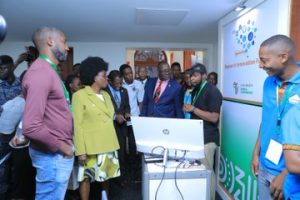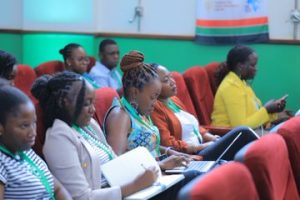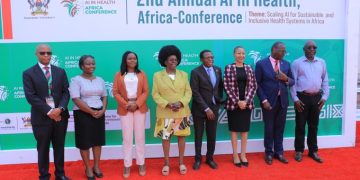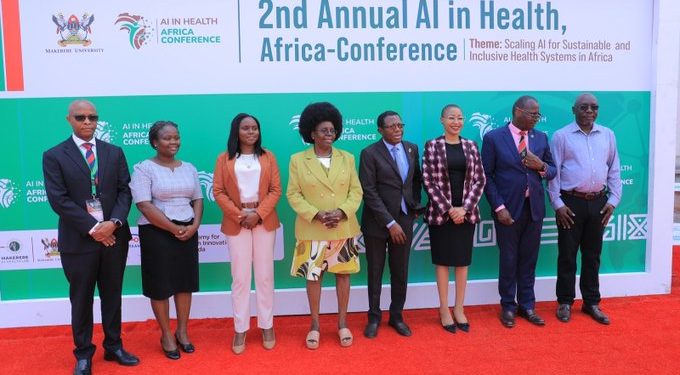The Minister for Science, Technology and Innovation, Hon. Dr Monica Musenero, has called on Ugandans to take a bold step from being mere consumers of technology to becoming creators and global contributors in the fast-evolving field of Artificial Intelligence (AI).
Speaking at the AI in Health Africa 2025 Conference hosted at Makerere University, Dr Musenero emphasised that Uganda must “define its own AI future” by developing technologies that respond to national priorities while competing on a global scale.
“This is the season for us to contribute to the world by partaking in the development and production of AI tools that will facilitate service delivery,” Dr Musenero said. “We must become creators, not just consumers. We must build our own foundations, own our data, and define our AI future on our own terms.”

She commended Makerere University for its growing number of AI-driven initiatives, but also challenged academia and innovators to think beyond prototypes. “I want to thank Makerere University for the initiatives they are having that are AI-centric. However, I challenge us to continue positioning ourselves upstream in the world of AI. You have the support of the Government of Uganda,” she said.
Dr Musenero highlighted the Life Sciences Innovation Centre—established by the Government of Uganda—as one of the key enablers for scaling up homegrown technologies. “The Life Sciences Innovation Centre will support technology companies that have scalable innovations that they are not able to scale on their own,” she noted.
She added that Uganda must now move from innovation to commercialisation, and from startups to “unicorns” — companies valued at over $1 billion — capable of transforming Africa’s tech economy. “It’s time for Africa, and especially Uganda, to see unicorns sprouting in the innovation space. The growing field of AI needs to take off here,” she urged.

Dr Musenero also emphasised that sustainability must underpin all innovation: “Sustainability is about economic sustainability. Everything can be economically viable if you are intentional about it. This aspect is still missing in African innovations.”
“Uganda will be a source of technology, not just a consumer. We want to be contributors. We want to sit at a round table, not a square table where others sit at the head.”
Makerere’s Role in AI for Health
Representing the Vice Chancellor, Prof. Buyinza Mukadasi, the Academic Registrar, said Makerere University was positioning itself as a leader in health-related AI research and application.
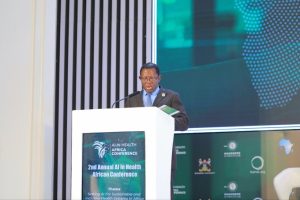
“Progress in AI will not come from competition but from collaboration and knowledge sharing for the good of society,” Prof. Buyinza said.
He added that the conference was focused on finding AI solutions that address the needs of vulnerable communities. “This conference is about the vulnerable communities that bear the burden of infectious diseases and limited access to quality healthcare in hard-to-reach areas — for which AI in health comes as an equaliser.”
Harnessing AI for Affordable and Accurate Healthcare
Prof. Tony Oyana, Principal of the College of Computing and Information Sciences (CoCIS), said AI offers transformative potential in solving longstanding challenges in healthcare delivery.
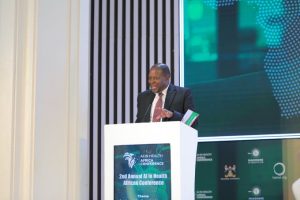
“One of the biggest challenges in healthcare is the affordability of quality diagnosis and wrong diagnosis,” Prof. Oyana said. “This is a gap that AI in health will solve if properly harnessed.”
He commended the strong partnership between Makerere University and the Infectious Diseases Institute (IDI), calling it “a strategic alliance for academia and society’s needs.”
AI Must Be African-Led, Ethical, and Inclusive
Dr Andrew Kambugu, Executive Director of the Infectious Diseases Institute (IDI), underscored that technology alone cannot transform healthcare unless African nations take ownership of their digital health ecosystems.
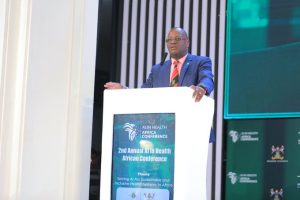
“For 20 years, IDI has been at the forefront of improving health in Uganda and beyond — from our early work on HIV and tuberculosis to our most recent innovations,” Dr Kambugu said.
“Technology alone is not enough. The central message of this conference is that Africa and the Global South must lead their own digital health revolution. AI in health must be African-led, ethical, and inclusive.”
He stressed that AI integration must consider ethics, governance, and data protection, ensuring public trust. “Our policies and frameworks must reflect our values and protect our people. As AI becomes embedded in our systems, we must ensure patient privacy, data sovereignty, and accountability.”

Dr Kambugu also highlighted the importance of human capital development to prepare for an AI-driven future. “AI will only transform health if our workforce is ready to use it confidently and effectively,” he said. “That is why this week includes masterclasses and workshops for doctors, nurses, data scientists, and policy-makers. We are embedding data science and AI training across our programs.”
The AI in Health Africa 2025 Conference, organised by the AI and Health Lab at Makerere University, brought together scientists, innovators, policymakers, and development partners to explore Africa’s leadership role in health-related AI innovation. Participants agreed that collaboration, not competition, will determine Africa’s success in harnessing artificial intelligence for the public good.
